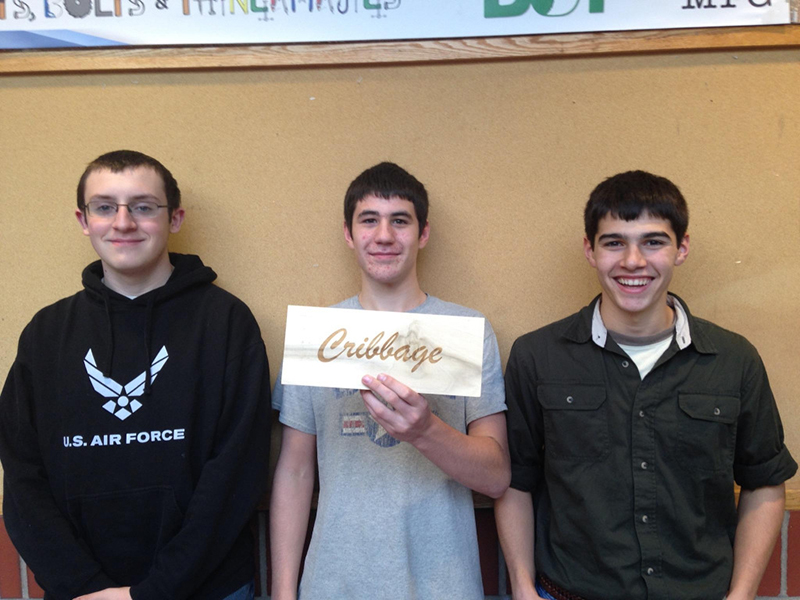
Jan 19, 2015 | Article
Pre-Engineering students at Milford High School & Applied Technology Center recently designed and built more than 20 cribbage boards for nursing homes in the Milford community.
According to pre-engineering teacher Frank Xydias, the boards were designed using the latest 3D parametric modeling software and CAM program. The students ran the program on a CNC router at which time the boards received detail with a laser engraving at Manchester Community College. The boards were then stained, assembled, and hand delivered by students, some of whom played cribbage with residents at one of the nursing homes.
“We were glad to give back to a community which already does so much for us,” said student Josh LaLancette. Noting he learned a lot in the project, fellow student Jackson Whitehouse said they worked through many problems from start to finish. “It was hard but worth it,” he said.
Student Jacob Girouard agreed, as he added, “Building the cribbage boards was an interesting experience. We had many hurdles we had to figure out and how to overcome them in order to create the finished product.”
Acknowledging the project was originally to be done in-house, Xydias said it was the students themselves who suggested making the boards for local nursing homes. “I followed their lead and supported their efforts,” he explained. “Having an opportunity to interact with the residents was a wonderful and unique experience.”
Jan 19, 2015 | Article
At UNH – Manchester on November 7, 2014, 28 girls from The Cheshire Career Center in Keene attended the 2014 biannual Women in Science and Technology (WIST) Forum. Thomas Burke, interim director at The Cheshire Career Center, helped coordinate the event, which brought together more than 300 girls from across the state.

Referring to it as “early intervention for STEM,” Burke said the event exposed students to the academic, collegiate, and industrial opportunities available today in the fields of Science, Technology, Engineering, and Mathematics. “There’s no shortage of jobs—the void is in the skillset available in the workforce,” he said. “LeBron James did not wait until his senior year in high school to pick up a basketball. The same is true for our future hall of fame scientists and engineers.”
The event was not just about STEM and the skills gap, as he acknowledged the absence of women in scientifically based careers and the manufacturing industries is much more than an issue of economics. It is an equity issue. “For one reason or another, women have not been allowed or encouraged to enter STEM fields,” he added. “It is an equity issue, as stereotypes and glass ceilings continue to prevail. This has not been going on for 10 years or 50 years for that matter—it has been going on forever.”
With such realities in mind, Burke said it was important the event brought in a wide array of role models for young women. One such role model at the event was Dr. Ann Marie Thomas, an MIT and CalTech trained Engineering professor who is now Director of the Playful Learning Lab at the University of St. Thomas in St. Paul, MN. Noted for her research into the playful side of engineering, including toy design and acrobatics, Dr. Thomas is also the author of Making Makers: Kids, Tools, and the Future of Innovation. At MIT and CalTech, she worked on developing underwater robotics and specialized in biologically inspired propulsion, while consulting on a musical earthquake-playing robot.
Students also sat in on a session focused on Pharmacy Sciences with guest speakers from the Massachusetts College of Pharmacy and Health Science (MCPHS). Jennifer Towle, one of 2,000 registered pharmacists in NH and Assistant Professor of Pharmacy Practice at MCPHS, encouraged attendees at her talk to consider their career interests now and emphasized practicality when making decisions on college financing. Other presenters, including Jennifer Kelleher, a doctoral candidate in Pharmacy, and Dr. Carol Goldsmith, an Associate Professor at MCPHS, cited opportunities for pharmacists in both manufacturing and the government. “When the girls heard that a retail pharmacist could earn upwards of $125,000 per year in this region, that got their attention, too,” said Burke.
One presentation put on by the Civil Engineer Corps Officer School (CECOS) of the US Navy also caught the attention of attendees, as it touted an exceptional program available to the brightest of engineering undergraduates. Beginning in their Junior year of college, engineering students can earn upwards of $3,900 per month just to attend school. For a specialist program, such as Nuclear Engineering, $4,700 per month is available.
“Add to that equation that a full-time civilian career with benefits awaiting them upon graduation, and it should get any kid thinking,” noted Burke, who said he believes events like the WIST Forum can help change a culture. “If I can play matchmaker between a student and a career, then that’s all the better.”


